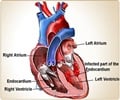An implantable cardiac resynchronization device and defibrillator reduces sharply deaths from mild heart failure, the American Heart Association's annual meeting in Chicago was told on Sunday.
An implantable cardiac resynchronization device and defibrillator reduces sharply deaths from mild heart failure, the American Heart Association's annual meeting in Chicago was told on Sunday.
The device’s manufacturers, Medtronic, reported that deaths plunged by as much as 29 per cent when compared to the results from defibrillators alone.Heart failure occurs when the muscles of the heart weaken and the ventricles fail to coordinate properly, or synchronize, reducing the ability of the organ to move blood throughout the body. In the most severe cases, patients become so weak that they are bedridden or suffer a variety of symptoms, such as shortness of breath, buildup of fluid in the lungs and other organs, confusion and fatigue. Patients with mild heart failure typically have few or no symptoms, but both groups have an equally high risk of atrial fibrillation (erratic heartbeats) or death.
Defibrillators keep patients alive by giving them an electric shock to restart the heart when there is sudden cardiac arrest or other life-threatening abnormal heart rhythm. The cardiac-resynchronization devices used in the current study have even more capabilities, and are designed to send electrical pulses to help keep the heart’s different chambers working in sync.
The Cardiac Resynchronization Therapy Defibrillators ( CRT-Ds) include an implantable cardioverter defibrillator, or ICD, to shock a racing heart back into normal rhythm.
"It is evident, very clearly, that ICD with CRT works, and works well, in patients with mild to moderate heart failure," Clyde Yancy, medical director at Baylor Heart and Vascular Institute, told the meeting.
Medtronic CRT devices currently are not approved for mildly symptomatic heart failure patients. The data will support the company's application with the U.S. Food and Drug Administration to market the products for use in this patient group.
Advertisement
The study, dubbed RAFT, showed patients on the combined ICD/CRT treatment were 25 percent less likely to die or be hospitalized for heart failure, compared with patients who didn't receive CRT.
Advertisement
"This study conclusively demonstrates that this particular therapy, in addition to an ICD, will save lives," said Anthony Tang, the study's lead author and an electrophysiologist at Royal Jubilee Hospital in Victoria, British Columbia.
The Raft study suggests CRT-D appears to have particular benefits in three subsets of heart failure patients: women, patients with an abnormality known as left bundle branch block in which contraction of the left ventricle is delayed, and those with a form of rapid heartbeat known as wide QRS complex, the researchers said.
The data with be examined in conjunction with earlier studies to determine which thresholds should trigger expanded indications, they said.
In September, Boston Scientific Corp won U.S. regulatory approval to promote three of its CRT-D devices for broader use among patients with heart failure, based on the results of its MADIT-CRT study, which showed patients fared better with a CRT-D than an ICD alone.
More than 22 million people worldwide have heart failure, in which the heart struggles to pump blood around the body, and early-stage patients make up about 70 percent of the total.
In the circumstances, the new device could come as a boon. But then they come at a price, a huge price at that. The MedTronic CRT-D cost $35,000 or so, just for the device alone, not to mention the costs of surgery required to install. Besides they might not be all that benign, warns Robert Langreth, writing on Forbes.com.
The operation to install the ICT device had double the complication rate compared to installing a plain defibrillator–118 of 888 patients with the fancier device got complications versus 61 of 898 with the simpler device.
Full cost benefit analysis of the fancier device has not yet been done. Doctors will likely look carefully at this data before giving it to everyone, experts stress.
Source-Medindia












